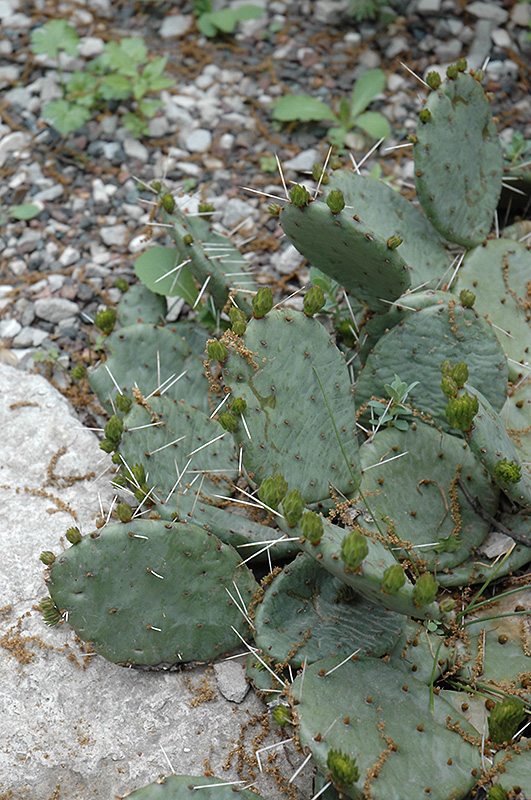Eastern Prickly Pear Cactus*
Opuntia compressa
* This is a "special order" plant - contact store for details
Height: 12 inches
Spread: 3 feet
Sunlight:
![]()
Hardiness Zone: 3a
Other Names: Humifusa Prickly Pear Cactus
Description:
A low growing spreading succulent cactus with showy butter yellow flowers that bloom in spring; exceptional as an accent for rock gardens and planters; needs perfect drainage and sandy or gravelly soils
Ornamental Features
Eastern Prickly Pear Cactus is a member of the cactus family, which are grown primarily for their characteristic shapes, their interesting features and textures, and their high tolerance for hot, dry growing environments. As an 'opuntiad' type of cactus, it doesn't actually have leaves, but rather modified succulent stems that comprise the bulk of the plant, and which are designed to retain water for long periods of time. This particular cactus is valued for its spreading habit of growth consisting of spiny bluish-green segmented pads that typically form 'branches' which trail along the ground. This plant has semi-double buttery yellow cup-shaped flowers at the ends of the stems in mid summer, which are interesting on close inspection. It features an abundance of magnificent red berries from late summer to mid winter.
This plant is primarily grown as an ornamental, but it's also valued for its edible qualities. The oblong sweet fruit is most often used in the following ways:
- Fresh Eating
- Cooking
- Preserves
Landscape Attributes
Eastern Prickly Pear Cactus is a small succulent evergreen plant with a spreading habit of growth that trails along the ground. It eventually becomes a spreading shrub-like plant with multiple 'branches' and stems. As a type of cactus, it has no true foliage; the body of the plant is wholly comprised of a linked series of spiny bluish-green pads which are connected together to form the branches of the plant.
This plant will require occasional maintenance and upkeep, and should never be pruned except to remove any dieback, as it tends not to take pruning well. Wandering segments or shoots can be carefully removed or thinned to control the overall spread of the plant. Deer don't particularly care for this plant and will usually leave it alone in favor of tastier treats. Gardeners should be aware of the following characteristic(s) that may warrant special consideration;
- Spiny
Eastern Prickly Pear Cactus is recommended for the following landscape applications;
- Mass Planting
- Rock/Alpine Gardens
- General Garden Use
- Groundcover
- Naturalizing And Woodland Gardens
- Container Planting
Planting & Growing
Eastern Prickly Pear Cactus will grow to be about 12 inches tall at maturity, with a spread of 3 feet. It grows at a medium rate, and under ideal conditions can be expected to live for approximately 20 years.
This plant should only be grown in full sunlight. It requires an extremely dry, well-drained growing location, and will usually die in standing water. It is considered to be drought-tolerant, and thus makes an ideal choice for a low-water garden or xeriscape application. Like most succulents and cacti, this plant prefers to grow in poor soils and should therefore never be fertilized. It is not particular as to soil pH, but grows best in sandy soils. It is quite intolerant of urban pollution, therefore inner city or urban streetside plantings are best avoided. This species is native to parts of North America. It can be propagated by division.
Eastern Prickly Pear Cactus is a fine choice for the garden, but it is also a good selection for planting in outdoor pots and containers. Because of its spreading habit of growth, it is ideally suited for use as a 'spiller' in the 'spiller-thriller-filler' container combination; plant it near the edges where it can spill gracefully over the pot. Note that when growing plants in outdoor containers and baskets, they may require more frequent waterings than they would in the yard or garden.
* This is a "special order" plant - contact store for details

